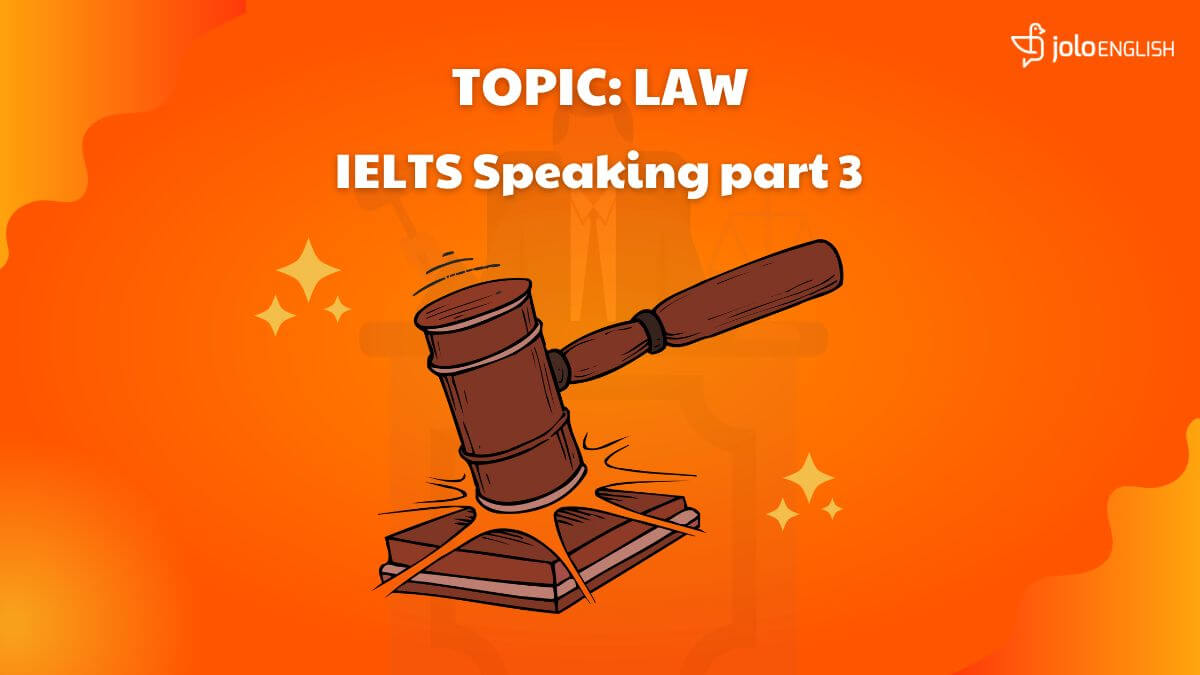Trong kỳ thi IELTS, phần Speaking luôn là một thử thách thú vị nhưng cũng đầy áp lực. Một trong những chủ đề thường gặp trong phần này là luật pháp, một lĩnh vực không chỉ đụng chạm đến các quy định xã hội mà còn phản ánh giá trị văn hóa và đạo đức của một quốc gia. Ở bài viết ngày hôm nay JOLO sẽ hướng dẫn các bạn những cách đơn giản nhưng cũng vô cùng hiệu quả trong việc trả lời các câu hỏi của phần Speaking part 3 theo chủ đề luật pháp:

Dưới đây là list câu hỏi thường xuất hiện trong chủ đề Law - Speaking Part 3.
1. What rules should students follow at school?
2. Do people in your country usually obey the law?
3. What kinds of behavior are considered as good behavior?
4. Do you think children can learn about the law outside of school?
5. What are the benefits for people to obey rules?
6. How can parents teach children to obey rules?
Cùng tham khảo câu trả lời mẫu chủ đề Law - Speaking part 3 dưới đây nhé!
- What rules should students follow at school?
→ Well, there are quite a few rules that students need to abide by. First and foremost, respecting teachers and classmates is crucial. This means paying attention during lessons, not interrupting others, and being polite in interactions. Additionally, academics are key – no cheating or allowed! Of course, there are also practical rules like, adhering to the dress code, and keeping the school clean and tidy.
- Do people in your country usually obey the law?
→ Generally speaking, the majority of people in my country do try to follow the law. However, as with any society, there are always some individuals who might bend or break the rules. The reasons for this can vary from a lack of awareness to a deliberate for authority. Fortunately, law enforcement agencies such as the police are in place to maintain order and ensure.
- What kinds of behavior are considered as good behavior?
→ Good behavior encompasses a wide range of actions that demonstrate respect, consideration, and empathy towards others. This includes being honest and truthful, keeping promises, offering help when needed, and refraining from causing harm or inconvenience to others. In essence, it's about treating others the way you'd like to be treated.
- Do you think children can learn about the law outside of school?
→ Absolutely! While schools play a role in educating children about basic legal concepts, learning about the law can happen in various settings. Parents can have conversations with their children about the importance of rules and, both at home and in society. Additionally, media like books, movies, and even the news can provide examples of legal issues and their impact on individuals and communities.
- What are the benefits for people to obey rules?
→ Obeying rules brings numerous benefits, both for individuals and society as a whole. For individuals, it a sense of responsibility and discipline, which are valuable life skills. It also helps to build trust and within communities. On a societal level, obeying rules ensures order, safety, and, allowing everyone to coexist peacefully and productively.
- How can parents teach children to obey rules?
→ Parents play a pivotal role in instilling a sense of respect for rules in their children. Leading by example is key – children are more likely to follow rules if they see their parents doing so. It's also important to explain the reasons behind rules, rather than just imposing them, such as praise and rewards for good behavior, can also be effective. And of course, consistent enforcement of consequences for breaking rules is crucial for children to understand the importance of.
Hy vọng rằng với những gợi ý và chiến lược được trình bày mà JOLO mang tới, bạn sẽ cảm thấy tự tin hơn khi đối diện với các câu hỏi về luật pháp trong Phần 3 của bài thi IELTS Speaking. Hãy nhớ rằng việc chuẩn bị kỹ lưỡng và thực hành thường xuyên sẽ giúp bạn không chỉ đạt điểm cao mà còn thể hiện quan điểm của mình một cách rõ ràng và thuyết phục. Chúc bạn thành công trong kỳ thi IELTS và đạt được mục tiêu của mình!
Để biết thêm chi tiết về các khóa học và tài liệu luyện thi IELTS, bạn có thể tham khảo thêm tại https://hoc-ielts.jolo.edu.vn/ hoặc liên hệ với JOLO qua hotline 093.618.7791 để được tư vấn và hỗ trợ.





















